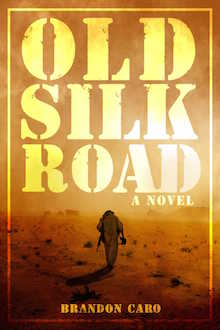Our Research Notes series invites authors to describe their process for a recent book, with “research” defined as broadly as they like. This week, Brandon Caro writes about Old Silk Road from Post Hill Press.
+
Non-Fiction
 The sound of rotor blades always made me feel like a grown-up. I’d only ever ridden on a helicopter once and that was literally a five-minute ride around the training area at Field Medical Service School in Camp Lejeune, NC. But in Afghanistan, I heard rotor blades all the time — from dual prop Chinooks transporting troops and supplies over peaks and through valleys, or from Apache gunship escorts, like angry wasps, following at a safe distance.
The sound of rotor blades always made me feel like a grown-up. I’d only ever ridden on a helicopter once and that was literally a five-minute ride around the training area at Field Medical Service School in Camp Lejeune, NC. But in Afghanistan, I heard rotor blades all the time — from dual prop Chinooks transporting troops and supplies over peaks and through valleys, or from Apache gunship escorts, like angry wasps, following at a safe distance.
The loudest blades I ever heard, though, belonged to a Blackhawk that didn’t fully touch down on the gravel landing zone as we passed the remains of Sergeant Holmes — minus the right leg, which was recovered hours later at the blast site — to the crew chief and his staff. We’d loaded the surviving casualties onto the previous helicopter, which probably had room for Sergeant Holmes’s body, but the policy was to MEDEVAC the dead and wounded out separately because riding with a KIA was bad for morale.
I was supposed to be on the convoy that morning, in the turret most likely. We were required to have at least 3 people in each vehicle, but we were shorthanded, so often we left the wire with a driver and gunner only. My superior, (one of many) Lieutenant Green had told me to mount the .50 cal to the turret. I asked him if I had time to get breakfast and he said yes. When I returned to the staging area, he told me we’d been taken off the convoy. Why, I wondered, but never found out.
An hour later the word got passed that we had casualties incoming. Finally, thought,_ I get to do my job. _Of course, I didn’t wish injury on any of my comrades. Their safety was paramount. But I couldn’t employ my learned skills as a combat medic if no one ever got hurt, so I guess I had mixed feelings about it.
The Humvees came screeching in through the front gate of our base, FOB Mehtar Lam, and we medics and corpsmen (the “p” and the “s” are silent, Mr. President) began our triage.
It wasn’t much of a triage, in fact. None of the injuries were life threatening, besides Sergeant Holmes’s and he was dead on arrival. But I remember a girl who’d been in the Humvee — the one that was struck by an IED and opened up like a can of beans — looked at me in this awful, horrified way, like she was trying to tell me something but couldn’t.
She’d been transferred from a Humvee onto a gurney in the triage area. One of the other medics tried to move her leg, and she cried out in terrible pain. Then someone hit her with a morphine stick. It might have been me, the memory is foggy.
The remaining injuries were minor by comparison. The guy in the turret had been ejected like a jack-in-the-box, thrown twenty or so feet. But he just had a few scratches, nothing serious.
Once we’d treated and documented their injuries, we ferried the wounded from the triage area to the landing zone for transfer to the next echelon of care. Then we got to Sergeant Holmes.
He’d been stuffed into the back of an EOD truck, which is not unlike a fire engine in shape and design, but taupe colored, not red. When the EOD techs pulled open the double doors of the truck’s backend, I became confused with what I was looking at. I knew it had to be human because of the fleshy matter that protruded from folds in the material. And I was certain it was an Army Soldier on account of the grey digi-patterned uniform. But the object had no shape. It looked like a pile of laundry.
I climbed into the truck and began organizing the extraction of Sergeant Holmes’s remains, which was a little outside the box for me. I usually waited for someone to tell me what to do. But no one did. They all just stood there, looking dumbfounded and thunderstruck at this hunk of meat that used to be a person, so I got in and started putting him in the bag.
The space was tight, and there were a few of us in there. And Sergeant Holmes was not a small man. Even with the right leg missing, he weighed in excess of two hundred pounds.
His belly had been split open and we could see everything. The blood had already coagulated, but rigor mortis had not yet set in, so we were able to fit him into the bag without too much trouble. The left arm was intact, but the bones from the right had been blown out. The right hand dangled from the shoulder by a flap of skin, but there was no arm. And his face was dirty.
Four, maybe five of us carried him to the landing zone. He was heavy, but we didn’t mind. I’d never met him, but they said he was a great soldier. And not just because he got killed. He really walked the walk.
The chow hall served Salisbury steak that afternoon, and I thought to myself, if there was ever a time to go vegetarian, it’s now! But I didn’t.
+++